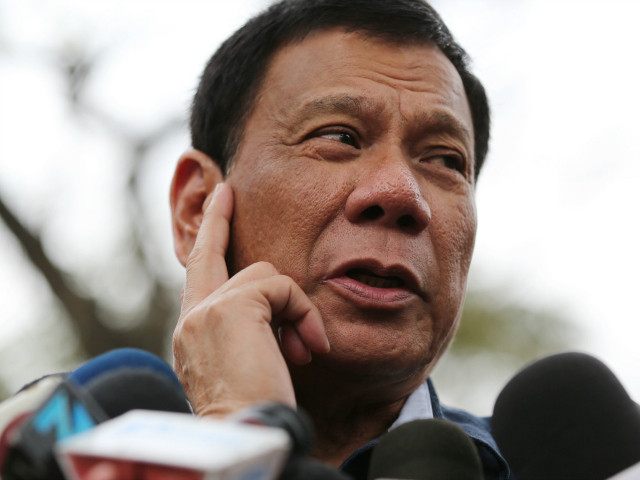The Philippines military has begun to take action against the nation’s Communist Party and its terrorist wing, the New People’s Army, after President Rodrigo Duterte announced he would stop seeking peace talks with the groups.
The new clashes, which the New York Times reports killed fifteen communists on Wednesday, follow a victory declaration in Marawi, southern Philippines, where the Islamic State terrorist group attempted to establish a “caliphate” beginning in May of this year.
The Times quotes local commander Brig. Gen. Arnulfo Marcelo Burgos as stating that clashes between the New People’s Army (NPA) and the Armed Forces of the Philippines (AFP) occurred 45 miles outside of Manila on Wednesday. “Troops in the countryside have been building up their forces against the New People’s Army, the armed wing of the underground Communist Party of the Philippines, which has been engaged in on-and-off peace talks with the government,” the Times explained.
The newspaper notes that the current clashes follow an incident in which the communists killed “an infant girl,” one of two victims, on Mindanao, Duterte’s native island. Mindanao is one of the most violent areas in the Philippines and home to Marawi, where the battle against the Islamic State in the country culminated.
The Philippine news site Rappler reported this week that, on Tuesday, Philippine troops “acted on a phoned-in tip” to approach the NPA fighters, who attacked first. The exchanged killed fifteen. Two soldiers suffered injuries in the incident. Rappler added that another nine communists were killed in a separate exchange in Sitio Batulao, Barangay Kaylaway.
“This encounter so far produced the biggest number of casualties on the side of the rebels and is a big blow to the NPA. We have been tracking their movements for two months, and we can expect another encounter soon if they don’t vacate Calabarzon,” Calabarzon police director Chief Superintendent Mao Aplasca said.
Duterte, who was elected president in 2016 on a law and order platform, alarmed some in the country when he announced a ceasefire against the NPA early in his tenure. He rapidly ended the ceasefire following violations by the group but has continued to pursue peace talks with the nation’s Marxist guerrillas, including allowing the release of some arrested for violent Marxist activities.
“If it took me some time to give my full support to Davao City Mayor Rodrigo “Digong” Duterte during the presidential campaign of 2016, it was due to his links with the Reds,” Philippine Star columnist Bobit Ávila wrote in a piece published Tuesday. He noted that “when [Duterte] formed his Cabinet, he put a lot of leftists in Cabinet positions, which alarmed many anti-communists who warned me that Pres. Duterte was forming an alliance or worse a coalition government with the Reds.”
Duterte put anti-communist minds at ease a week ago, when he announced that he would no longer pursue peace talks with the NPA. “Let it not be said that I did not try to reach out to them,” he lamented. To those released, he demanded, “Surrender or face again punitive action.”
Last week, before the official declaration of an end to talks, Duterte warned that he would treat all those engaging in leftist violence and enabling it as terrorists. “I will simply declare you all terrorists. … We will treat you as a criminal, period. And we will arrest everybody connected and even their legal fronts,” he warned.
The U.S. State Department designated the NPA and the official Communist Party of the Philippines (CPP) jointly a terrorist organization in 2002. The Philippines has yet to follow suit.
Following the official announcement, presidential spokesman Harry Roque elaborated that the government had preferred an attempt at peace talks to the current state. “While we agreed to resume peace talks with the aforementioned group and exerted our best efforts to accelerate the signing and implementation of the final peace agreement, the NDF-CPP-NPA has engaged in acts of violence and hostilities,” he told reporters, according to the Philippine Star. The NDF, the Star notes, is the “negotiating” arm of the NPA.
The head of the CPP, Jose Maria Sison, compared Duterte’s actions against violent communists to the nation’s ongoing war on drugs, which international human rights activists have condemned due to Duterte’s vocal support for extra-judicial killing. Sison accused Duterte of “sabotaging” the peace talks by “ranting” and ending the peace talks before negotiations could begin on joint agreement documents.
Sison once served as Duterte’s college professor, a personal link the CPP appeared hopeful to exploit.
Other CPP leaders joined in calling Duterte a “bully” and “dictator,” according to the Manila Times. Duterte won the presidency in an election that was not contested by any opposition or electoral observer group.
“These communists, calling me a dictator, an executioner, somebody corrupt … [but I say to you], do not be afraid of dictatorship,” Duterte replied on Thursday. “I am not aiming for it. I do not ask [for] it and I do not like it.”
“If I am a fascist that you [communists] say I am, [then] why talk to me?” Duterte asked. “If that is the way, how you view me, then do not talk to me. Wait for a leader that would be to your liking your predilections.”

COMMENTS
Please let us know if you're having issues with commenting.